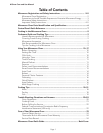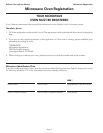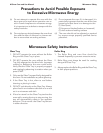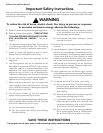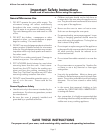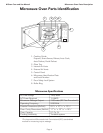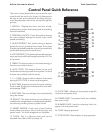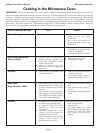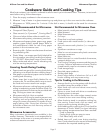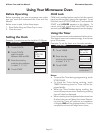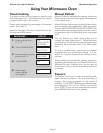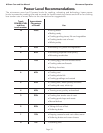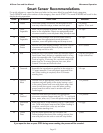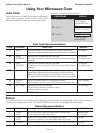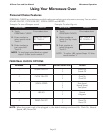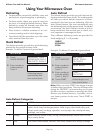M Oven Care and Use Manual
Page 9
Utensils Recommended for Microwave
• Ovenproof Glass (Pyrex
®
)
• Glass ceramic (i.e. Pyroceram
®
, Corning Ware
®
)
• China and other dishes without metallic trim
• Microwave-safe pottery, stoneware, porcelain
• Microwave-safe paper plates, paper cups, paper
napkins, paper towels, waxed paper. Refer to
the manufacturer’s label for use of any paper
product in the microwave oven.
• Browning dish - Follow manufacturers directions
for preheating dish.
• Plastic Wrap - use wraps specifically labeled for
the microwave; use during cooking and reheat-
ing. DO NOT allow plastic wrap to touch food.
• Straw, wicker and wood - use for reheating only
at a low serving temperature.
Covering Foods During Cooking
• Paper towels are good for covering food during
reheating or to absorb fat when cooking bacon.
• Wax paper or parchment paper can be used for
cooking and reheating.
• Plastic wrap that is specifically labeled for mi-
crowave use. Do not allow plastic wrap to touch
the food and vent so steam can escape.
• Microwave-safe oven cooking bags are good for
aiding in tenderizing meats and other foods. Do
not use metal twist tie that may be provided with
bag. Slit bag so steam can escape.
• Microwave-safe lids. Vent as needed.
• Small pieces of foil may be used to prevent over
cooking, such as for shielding poultry legs and
wings or corners of brownies in a square or rect-
angle baking dish. Note that aluminum foil
should be at least one inch from any surface of
the microwave oven.
Microwave Accessories
Many microwave accessories are available in the
market. However, Thermador is not responsible for
any damage to the oven or to oven parts when mi-
crowave accessories are used.
Cookware Guide and Cooking Tips
Most heat-resistant, non-metallic cookware is safe for use in your microwave oven. However, to test cook-
ware before using, follow these steps:
1. Place the empty cookware in the microwave oven.
2. Measure 1 cup of water in a glass-measuring cup and place cup in the oven next to the cookware.
3. Microwave on 100% power for 1 minute. If the dish is warm, it should not be used for microwave
cooking.
Not Recommended for Microwave Oven
• Metal utensils, metal pans and metal bakeware
• Metal skewers
• Metal thermometers
• Foil trays
• Glass that is not heat-resistant
• Food carton with metal handle (i.e. take-out
carton)
• Non-microwave-safe plastics (i.e. margarine
tubs)
• Styrofoam containers or cups
• Metal or non-microwave-safe plastic commuter
beverage containers
• Metal twist ties
• Metal-trimmed or metal-banded dinnerware,
casserole dishes, etc.
• The Corning Company recommends that you do
not use Centura
®
tableware and some Corelle
®
closed-handle cups for microwave cooking.
• Food storage bags
• Recycled paper products
• Brown paper bags
• Avoid large sheets of aluminum foil as it will
hinder cooking and may cause arcing.
Tips for Cooking in the Microwave
• Arrange food in a circular pattern with the thick-
est areas toward the outside of dish.
• Most foods will cook and reheat more evenly
when covered.
• Pierce or score foods with skins or membranes
allowing steam to escape.
• Stir foods from the outer edges toward center
of utensil or turn over once during cooking.
• Allow foods to stand to complete cooking be-
fore serving. Some foods, such as meats, will
require covering during standing time.
• Avoid adding extra cooking time. First check for
doneness of foods. Watch for signs indicating
that cooking temperatures have been reached:
- Food is steaming
- Poultry thigh joints are easy to move
- Fish flakes easily with a fork
• Baked items will cook more during standing
time. Foods should not be served immediately;
remember the required standing time.
Microwave Operation



